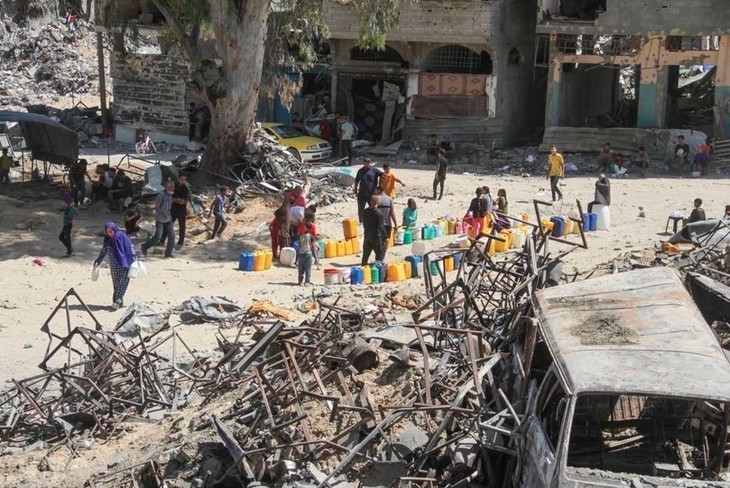(VOVWORLD) -The United Nations General Assembly designated August 19th as World Humanitarian Day to raise community awareness of global humanitarian issues. This year humanity is facing the most serious challenges in decades.
In the Global Humanitarian Overview published on June 26 the UN said the first half of 2024 was characterized by extreme challenges, from attacks on health, education, and water and sanitation facilities that left millions of people without access to the services they need to survive and thrive to the killing, injury, and detention of aid workers.
Gaza and Sudan
The conflict in the Gaza Strip and the civil war in Sudan continue to be the two most heinous humanitarian hotspots globally. Statistics provided by UN humanitarian agencies in the Gaza Strip show that in nearly a year of conflict over 40,000 Palestinians in Gaza have died. Two thirds of them were civilians, most of them elderly, women, or children.
The level of violence in Gaza has surpassed all other conflicts in the world in the past three decades. In addition to a shocking number of civilian casualties on both sides, the conflict between Israel and Hamas has created a humanitarian tragedy.
Since the conflict broke out last October, 90% of Gaza's 2.3 million people have fled their homes, and 80% of Gaza’s health, education, and clean water facilities have been destroyed, creating hardships for millions of people. A spread of the polio virus is threatening the lives of hundreds of thousands of children.
UN Secretary General Antonio Guterres, said: “Gaza is in a humanitarian freefall. Just when it seems the situation could not get worse for Palestinians in Gaza, the suffering grows – and the world watches. In recent weeks, the poliovirus has been detected in wastewater samples in Khan Younis and Deir al-Balah. That means the virus is now circulating, with hundreds of thousands of children in Gaza at risk.”
Last Saturday, the UN requested all parties to the Gaza conflict to implement two humanitarian pauses of seven days to conduct two polio vaccination campaigns. During each round, an oral polio vaccine will be administered to more than 640,000 children under ten years of age.
The humanitarian crisis in Sudan has crossed every red line set by UN humanitarian agencies. Since civil war broke out in April last year more than 10 million people have fled their homes and 80% of medical facilities have been shut down. Sudan is currently experiencing the largest famine in the world.
Leni Kinzli, a spokesperson for the World Food Program in Sudan, said: “This is the world’s biggest famine. Over 25.6 million people are experiencing catastrophic levels of food insecurity. It’s equivalent to 54% of Sudan’s population.”
UNICEF said Monday that at least 77 million children, one-third of the children in the Middle East and North Africa, are malnourished.
 People at Jabalia refugee camp in Gaza (Photo: Xinhua/VNA) People at Jabalia refugee camp in Gaza (Photo: Xinhua/VNA) |
Act for humanity
Aid workers on the frontlines of the world's conflicts are being killed in unprecedented numbers. The UN reported that, with 280 aid workers killed in 33 countries last year, 2023 marked the deadliest year on record for the global humanitarian community.
This outrageously high number represents a 137% increase compared to 2022, when 118 aid workers were killed. This year may be on track to be even deadlier. As of August 7, 172 aid workers have been killed. This is the largest number of humanitarian aid worker casualties in history and is twice the average of the past 20 years.
Ben Majekodunmi, the Chief of Staff of the United Nations Relief and Works Agency for Palestine Refugees in the Near East (UNRWA), said: “At least 298 humanitarian personnel have been killed, from Palestinian and international NGOs and from the UN. At least 209 are UN staff, including those from UNRWA, WHO, UNDP and UNDSS.”
Not only are their lives threatened, humanitarian workers are working in increasingly difficult conditions. In the GHO report, the UN said UN humanitarian agencies and partners need at least 48.65 billion USD this year to help more than 186 million people worldwide. As of the end of July, however, they had received just over 12 billion USD, 25% of the target and 11% less than they received in the same period last year.
On this year's World Humanitarian Day, the UN launched the campaign "Act for Humanity", underlining that the current violence against aid workers and lack of accountability are unacceptable and demanding that those in power act to end violations against civilians and the impunity with which these heinous attacks are committed.